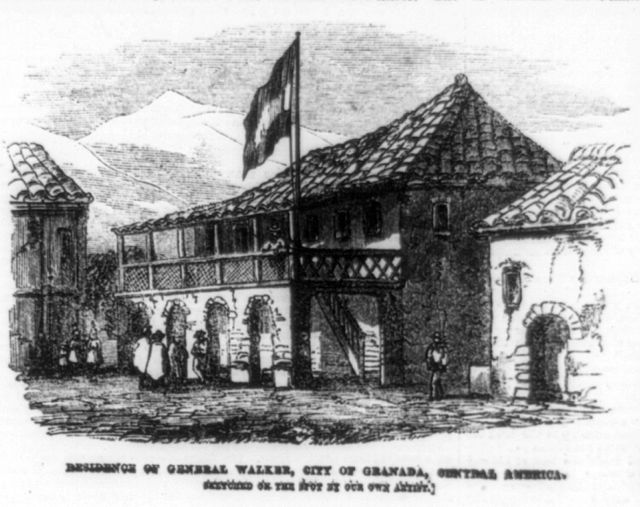The Filibuster War or Walker affair was a military conflict between filibustering multinational troops stationed in Nicaragua and a coalition of Central American armies. An American mercenary, William Walker, invaded Nicaragua in 1855 with a small private army. He seized control of the country by 1856, but was ousted the following year.
Costa Rican troops attacking William Walker at Rivas in 1856
William Walker, the self-proclaimed American President of Nicaragua, who conquered the Nicaraguans and occupied their country from 1855 to 1857
President Walker's house in Granada, Nicaragua. On 12 October 1856, during the siege of Granada, Guatemalan officer José Víctor Zavala ran under heavy fire to capture the Walker flag and bring it back to the Central American coalition army trenches shouting "Filibuster bullets don't kill!" Zavala survived this adventure unscathed.
Representation of La Pedrada, scene of Andrés Castro overthrowing American filibuster invaders in the Battle of San Jacinto during the War of 1856 in Nicaragua. Oil on canvas painting by the Chilean painter, Luis Vergara Ahumada.
A filibuster, also known as a freebooter, is someone who engages in an unauthorized military expedition into a foreign country or territory to foster or support a political revolution or secession. The term is usually applied to United States citizens who incited insurrections across Latin America, particularly in the mid-19th century, usually with the goal of establishing an American-loyal regime that could later be annexed into, or serve the interests of, the United States. Probably the most notable example is the Filibuster War initiated by William Walker in Nicaragua in the 1850s.
Battle of San Jacinto in Nicaragua in 1856
William Walker is a famous filibuster, having failed at multiple attempts to invade Latin American countries and establish a pro-slavery, American regime.




